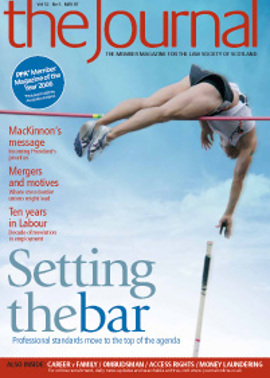Dealing positively with client concerns

A brief history of complaint handling
Traditionally complaints were viewed as allegations of misconduct against an individual providing a service at the point of delivery. The courts have recognised misconduct as a serious matter, so it is not surprising that facing an allegation can provoke a defensive reaction, particularly if the individual subject to it is left to deal with it alone.
The modern approach is to view complaints as opportunities for learning, as an element of client feedback that can lead to an improved service. When complaints arise, the reaction should be to look at whether systems and processes within the firm or company could be improved, rather than simply examining how an individual should be punished.
The demand for a choice of means of redress by consumer organisations has also increased. Consumers now expect to receive a prompt response, an apology where justified and details of any changes made, rather than payment of money after a lengthy investigation. Consumers do still want monetary redress where appropriate, but their focus has shifted from wanting to punish individuals. Those regulating complaints handling have evolved accordingly.
Relevance to the Scottish legal profession
Many changes have been made within the Scottish legal profession. It was recognised in 1989 that complaints could be made about inadequate professional service separately from misconduct matters. New forms of redress, including rectification and requiring solicitors to take positive action, have been in existence for some time. Increasingly, firms also issue apologies. The profession now faces further change with the abolition of the Scottish Legal Services Ombudsman and creation of the Scottish Legal Complaints Commission. However, the way service and misconduct complaints are handled has not significantly differed in recent years.
What will the further changes be?
The Society’s current complaint system is generally geared towards providing redress if service complaints are proved on the balance of probabilities. There is little the Society can do to encourage a settlement by agreement; resources do not stretch to provision of mediation services and, despite the best efforts of all involved, the Society is simply not regarded by many complainers as a neutral third party. There is little opportunity to encourage learning by the profession where IPS is not proved but it is quite clear things have not gone well. The Ombudsman cannot suggest that apologies are issued, or easily intervene to settle disputes. Whilst we cannot second guess the way the new Commission will elect to work, the new Act does give some strong clues.
It seems likely from the framing of the Legal Profession and Legal Aid (Scotland) Act – particularly Part 1, s 8 – that the new Commission will encourage much greater emphasis on resolving complaints locally or agreeing as many issues as feasible, with only intractable disputes moving through to a final determination. The new Commission will have powers to refer complaints back to practitioners so a negotiated settlement can be achieved, to mediate disputes and, potentially, to charge firms that do not resolve disputes themselves.
The new Commission will also have powers to charge firms where documents need to be recovered, and to levy interest on late payments. Again, these measures are designed to encourage early attention to, and resolution of, complaints.
New powers granted to the Society, which will allow errors to be picked up early and corrective measures to be imposed, should encourage lessons to be learned. The Society will be able to identify unsatisfactory conduct and impose different learning sanctions, including the power to order retraining in appropriate cases.
How will all this impact on firms’ client care?
- Letters of engagement: A way of ensuring there are fewer areas of dispute is to provide clear letters of engagement. These are likely to become increasingly important if disputes are to be resolved by explanation. If they set out clearly what was to be done for what fee, there is less scope for disputes to arise through misunderstandings. This also makes it easier to identify when a service has been deficient, or explain why this is not the case. In the experience of the Society and the Ombudsman, misunderstandings about fee levels and form of service lead to a high percentage of complaints.
- Client relations partners: The role of the client relations partner will become more important, as one aim of the new provisions is to encourage local resolution of disputes. Moreover, if complaints to the new Commission escalate, client relations partners will be forced to make an objective decision about the merits of a complaint at a much earlier stage. Client relations partners provide a logical focal point for improving communications with the profession in an effort to promote good practice and better client care.
- Firms’ complaint systems: Modern complaints handling demands a fast and open response to complaints. Those subject to complaints must show a willingness to learn from them and to listen to clients. Firms will have to consider complaints constructively from day one and be prepared to reach agreement by negotiation. Sole practitioners may have to think of ways of bringing in neutral third parties to assess their actions, while larger firms will have to ensure that client relations partners encourage an objective review of issues.
- Profession as a whole: Consumers now expect service providers to act responsibly when concerns are raised. If the Scottish legal profession communicates well with clients and responds constructively to criticism, it will add to overall quality of service provision.
Prepare now
The new Commission offers real opportunities for more constructive complaints handling, but it also presents new challenges for the legal profession. Preparation now is the key
In this issue
- Block fees: the story behind the changes
- Strategic advance
- Court plans with little appeal
- Under commission
- Two into one can go
- Ten years of labour
- Career v Family
- Monitor - at your own risk
- Raising the standard
- Society shapes the changes
- Society shapes the changes (1)
- Money laundering to change again
- Border and Immigration Agency launches
- Dealing positively with client concerns
- From the Brussels office
- Winning ways
- Toothless against spam?
- Risk reinvented
- Technical but essential
- Pension sharing tips on divorce
- In pursuit of simplicity
- In pursuit of simplicity (1)
- First in the class
- Scottish Solicitors' Discipline Tribunal
- Website reviews
- Book reviews
- On the road
- Access or excess?
- Alterations are no 2 problem
- ARTL: upgrade now for security






